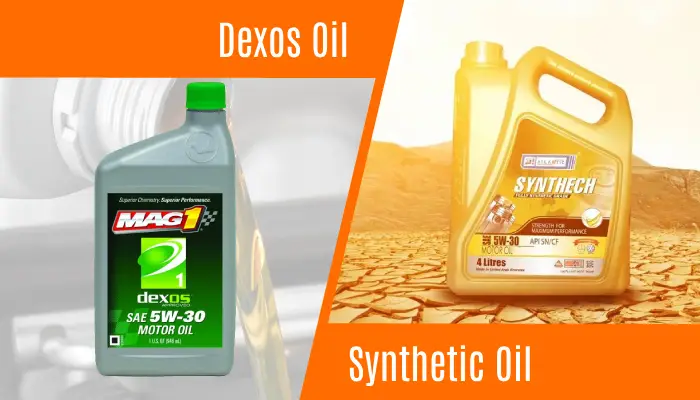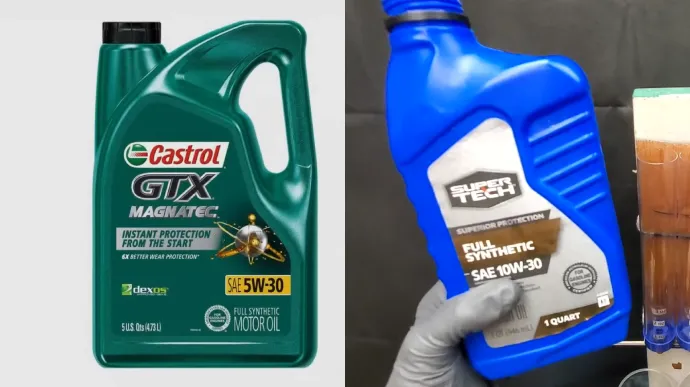Physical Address
304 North Cardinal St.
Dorchester Center, MA 02124
Physical Address
304 North Cardinal St.
Dorchester Center, MA 02124

Car engine maintenance is essential, and choosing the proper engine oil based on its type is essential for your vehicle’s performance and longevity. Two popular engine oils on the market today are Dexos oil and Synthetic oil. But what are their differences, and which engine oil is right for your vehicle?
Dexos oil is specifically formulated for General Motors (GM) engines and balances performance and cost-effectiveness. However, Synthetic oils are entirely man-made and have a uniform molecular structure, providing enhanced performance and protection.
Throughout this article, we will explore the differences between Dexos oil and regular Synthetic oil and their targeted use. By the end of this article, you’ll know which oil is best for your car engine.

When comparing Dexos oil and regular synthetic oil for lubricating vehicle engines, several key differences exist to consider.
Dexos oil, formulated and licensed by General Motors, combines conventional and synthetic base oils. This combination allows Dexos oil to provide a balance between performance and cost-effectiveness.
These rated oils exhibit better resistance to oxidation and thermal breakdown, ensuring superior engine protection even under extreme operating conditions.
Conversely, synthetic oil is entirely artificial and produced through a chemical process. This results in a uniform molecular structure, giving synthetic oil enhanced performance and protection compared to conventional oils.
Dexos oil is designed for General Motors (GM) engines, ensuring optimal performance and longevity. It’s formulated to meet the unique requirements of GM vehicles, enhancing fuel efficiency, extending the life of the emissions system, and reducing the frequency of oil changes.
In fact, the use of Dexos oil is essential to maintain warranties for GM vehicles produced in and after 2011.
Alternatively, synthetic oil is a versatile option suitable for many vehicles, including high-mileage and those subjected to extreme conditions. It offers excellent compatibility with various engine types, making it a popular choice among car owners.
Dexos oil, specifically formulated for GM engines, contains a tailored blend of additives to meet the unique requirements of these vehicles. These additives focus on improving fuel efficiency and reducing emissions, aligning with GM’s environmental goals.
Meanwhile, synthetic oil is designed for use in various engines and can contain a broader selection of additives. These additives enhance wear protection, keep the engine cleaner, and improve overall performance.
Regarding extreme conditions, Dexos oil may not perform as well as synthetic oil in lubricating vehicle engines. Although Dexos oil meets GM’s performance standards and performs well under typical driving conditions, it may struggle to maintain its lubricating properties under extreme heat, cold, or heavy loads.
Then again, synthetic oils excel in these extreme conditions. They’re engineered to maintain their viscosity and lubricating properties, ensuring optimal engine performance even when subjected to high temperatures or high-stress situations.
Dexos oil, used in the United States and Australia, may have regional variations to meet local requirements. These variations are specifically designed to cater to different climates and driving conditions.
However, synthetic oil brands are produced globally. While they may have variations for specific regions, they generally exhibit more consistent performance characteristics. This means synthetic oil, regardless of the region, tends to provide a more predictable and reliable performance than Dexos oil.
Dexos oil, due to its specialized formulation and licensing, can be more expensive than conventional or generic synthetic oils. This is because it meets the requirements of General Motors (GM) and may be necessary to maintain your GM vehicle’s warranty.
On the other hand, synthetic oils come in various prices depending on the brand and quality. While some premium synthetic oils can be more expensive, cost-effective options that still provide excellent protection for your engine are available.
| Aspect | Dexos Oil | Synthetic Oil |
| Targeted Use and Compatibility | Designed for GM engines. Recommended for GM vehicles produced after 2011. | Suitable for a wide range of vehicles. |
| Composition and Structure | Typically blend synthetic and conventional base oils. | Entirely man-made with a uniform molecular structure. |
| Performance Under Extreme Conditions | Performs well under typical driving conditions. | Excels in extreme conditions, maintaining viscosity and lubrication properties. |
| Cost and Compatibility | More expensive due to specialized formulation. | Offers a range of prices, including premium and cost-effective options, |

When choosing the right Dexos oil for your vehicle, understand the different types available.
Dexos 1 is specifically designed for GM GDI (Gasoline Direct Injection) engines and provides superior sludge control, aeration resistance, wear protection, low-temperature performance, and control over deposit formation.
Over time, Dexos 1 has evolved with stricter standards and additional testing criteria, such as low-speed pre-ignition and improved aeration resistance. This means that Dexos 1 Gen 2 and Gen 3 oils offer even better performance and protection for your vehicle.
To cater to the diverse needs of different types of vehicles, Dexos 2 oil is specifically formulated. It’s designed for GM’s light-duty diesel engines and some European gasoline engines.
Dexos 2 oil is formulated to reduce soot production and maintain high-temperature shear viscosity, which is crucial for diesel engines. This oil is engineered to provide optimal performance and protection, ensuring your vehicle’s engine operates at its best.
Dexos 2 oil meets the stringent requirements set by GM and is recommended for vehicles that require this specific formulation.
Dexos D oil is designed for light-duty Duramax diesel engines and comes in a grade of 0W-20. Its application is unique, as it’s formulated to provide the necessary lubrication for these specific engines.
This oil offers superior protection against wear, deposits, and sludge formation, ensuring your engine stays clean and operates at its best. It also helps to improve fuel efficiency and reduce emissions.
Dexos® synthetic oils are high-quality products formulated with advanced antioxidant technology. This technology prevents oil from oxidizing and provides exceptional performance benefits.
According to General Motors, who conducted various in-house tests, Dexos outperformed other synthetic or conventional oils. This means that Dexos oil brings long-term benefits, giving drivers peace of mind that their engine receives the best possible lubrication.
Also, all Dexos synthetic oils undergo rigorous testing with modern engines in GM’s labs, ensuring top performance and reliability.
Dexos oil is designed and approved by General Motors (GM) for use in their vehicles. It undergoes rigorous testing in GM laboratories to ensure that it meets optimal engine performance and protection requirements.
While other oils may claim to meet these requirements, Dexos oil has been specifically formulated to deliver the best results in GM vehicles. Using Dexos oil can help prolong the life of your engine, improve fuel efficiency, and maintain your vehicle’s performance.
The answer is no. While most synthetic oils are Dexos certified, not all meet this certification’s requirements.
Dexos certification is a standard General Motors (GM) set to ensure optimal performance and protection for their vehicles’ engines. It involves rigorous testing and evaluating the oil’s performance in various conditions.
Dexos oils have been shown to outperform other synthetic or conventional oils in in-house tests conducted by GM. However, note that there are non-synthetic oils that are also Dexos-certified.
You can use synthetic oil instead of Dexos. Dexos is a full synthetic oil specifically formulated for GM cars, but any full synthetic oil that meets the GM Dexos standard can be used.
Remember that using a fully synthetic oil that meets the Dexos standard ensures that you’re using an oil tested and approved by GM for optimal performance in their vehicles.
The Dexos standard guarantees that the oil meets the specific requirements set by GM, such as improved fuel economy, enhanced engine protection, and reduced wear and tear.
As we’ve explored the differences, Dexos, and Synthetic oils have unique characteristics and are designed for different purposes. Dexos oil is tailor-made for General Motors vehicles to enhance fuel efficiency, while Synthetic oil is engineered for a broader spectrum of vehicles.
Both oils have advantages, depending on the type of vehicle and driving conditions. It’s essential to research and consult your vehicle’s manual or a professional technician to determine the right engine oil for your car.
So, if you want to maximize the lifespan and efficiency of your GM vehicle, using Dexos-rated synthetic oil is a smart choice.